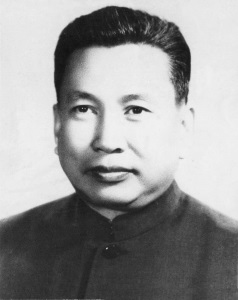POL POT
(1925/28 - 1998)
 Pol Pot (born
Saloth Sār; 25 May 1925 or 1928 – 15 April 1998) was a Cambodian revolutionary and politician who governed Cambodia as the Prime Minister of Democratic Kampuchea between 1976 and 1979. He was a leading member of Cambodia's Khmer Rouge movement from 1963 until 1997 and served as the General Secretary of the Communist Party of Kampuchea from 1963 to 1981.
Pol Pot (born
Saloth Sār; 25 May 1925 or 1928 – 15 April 1998) was a Cambodian revolutionary and politician who governed Cambodia as the Prime Minister of Democratic Kampuchea between 1976 and 1979. He was a leading member of Cambodia's Khmer Rouge movement from 1963 until 1997 and served as the General Secretary of the Communist Party of Kampuchea from 1963 to 1981.
To his supporters, he was an advocate of communism who championed Cambodian sovereignty in the face of Vietnamese aggression, and the Chinese government supported him and the Khmer Rouge as a bulwark against Soviet influence in the region. Conversely, he has been internationally reviled for his role in what has come to be called the “Cambodian genocide”.
Under his administration, Cambodia was converted into a one-party state governed according to Pol Pot's particular political worldview. Broadly influenced by Maoism, he however pushed its tenets to the extreme. Combining the lessons of the Chinese revolution with Khmer nationalism, Pol Pot came to favor a sort of xenophobic and peasant-based autarky.
Under the Khmer Rouge Cambodia underwent rapid forced collectivization of agriculture and land redistribution ‒measures which did initially benefit the poorest strata in Cambodian society. The regime also implemented massive forced population transfers from the cities to the countryside, including the emptying of the capital city of Phnom Penh, a city of two million. “New people” ‒those transferred to the countryside‒, ethnic minorities, and foreigners were treated with suspicion. "Bad elements", those who clung to old ways, who complained, or who were too weak to work, were executed. Many were condemned as counterrevolutionaries simply based on their appearance, previous professions, or background. Torture was widespread.
Under Pol Pot and the Khmer Rouge, Cambodia became internationally infamous for its “killing fields” and the dreaded Tuol Sleng (S-21) torture and extermination complex in Phnom Penh. By the time they were overthrown by Vietnamese forces in 1979, mass killings, coupled with malnutrition and poor medical care, had killed between 1.5 million and 2 million Cambodians, approximately a quarter of of the country's population.
Pol Pot himself died quietly in his bed on the night of April 15, 1998.
Under house arrest by a rival Khmer Rouge faction, plagued by malaria and heart
problems, and
facing possibly being handed over to an international tribunal, he reportedly suffered heart failure. It has also been suggested that his death was
a suicide, from an intentional overdose of painkillers and anti-malaria
medication.
Documents
1952: Monarchy or Democracy
1976: Words of Condolence Upon the Death of Chairman Mao Zedong
1977: Chinese and Kampuchean Leaders Meet: 'Great Unbreakable Solidarity'
1977: Long Live the 17th Anniversary of the Communist Party of Kampuchea
1977: Discussion with Chinese Premier Hua Guofeng
1978: Interview given to the Delegation of Yugoslavian Journalists in Visit to Democratic Kampuchea
1978: On Vietnamese aggression
1978: Talks with the Delegation of the Association Belgium-Kampuchea
1978: Talks with the Delegation of the Sweden-Kampuchea Friendship Association
1978: Interview to the Representatives of the Hong Kong's Newspapers Wen Wei Po and Ta Kun Pao
1978: "We will never let Vietnam swallow our country"
1979: Pol Pot gives first interview since Vietnamese invasion
1979: Six Factors Necessary for Victory in the War of Resistance Against Vietnam's Aggression
See also:
Biography of Comrade Pol Pot, Secretary of the Central Committee of the Communist Party of Kampuchea, by Department of Press and Information of the Ministry of Foreign Affairs of Democratic Kampuchea (September 1978)